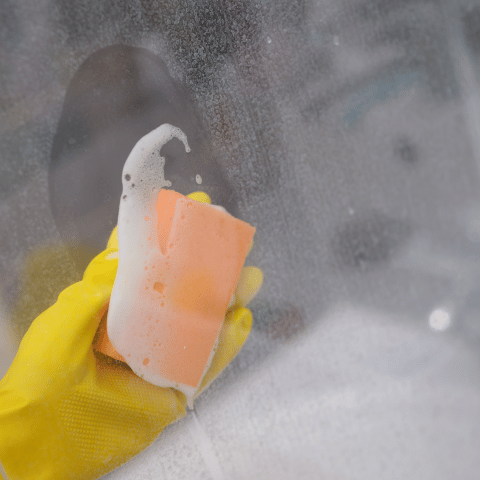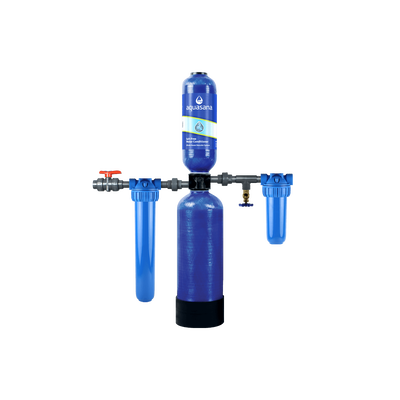What are hard water stains?
Hard water stains appear as white spots or a chalky residue on surfaces, and they’re caused by the evaporation of hard water. When hard water evaporates, mineral deposits from calcium and magnesium are left behind, leaving noticeable spots on surfaces that are frequently exposed to water, such as faucets, glass, or tiles. The higher the mineral content in your water, the more stubborn and frequent these stains can become.
Ways to remove hard water stains
There are several ways to remove hard water stains using common household materials, though some methods work better on certain surfaces than others.
1. Baking soda
Baking soda is mildly abrasive, which makes it great for scrubbing away the mineral buildup left behind by hard water without scratching most surfaces. It also helps neutralize odors and can be combined with other ingredients, like vinegar or lemon juice, to boost its stain-fighting power.

2. Vinegar
Vinegar is acidic, which helps dissolve the mineral deposits that cause hard water stains, making them easier to wipe away. It’s especially effective on glass, chrome, and tile surfaces, breaking down buildup without the need for harsh chemicals. Plus, it’s safe, natural, and easy to use straight from the bottle or mixed with water.
3. Hydrogen peroxide
Hydrogen peroxide acts as a gentle bleaching agent that helps dissolve mineral deposits and lighten the discoloration caused by hard water stains. It's especially effective on lighter or whiter-colored surfaces where stains can be more noticeable. When mixed with baking soda, it creates a powerful paste that works well on tougher, more stubborn buildup.
4. Borax
Borax is a natural mineral that can be combined with vinegar to create a powerful paste that targets tough hard water stains. Its mild abrasiveness helps remove buildup, while its alkaline nature helps dissolve tough residues.
5. Commercial hard water stain removers
Commercial hard water stain removers are specifically formulated to target and break down mineral deposits left by hard water, often using stronger acids or specialized cleaning agents. They can be highly effective on tough stains, especially in areas where other household solutions may not work as well. These products are designed to dissolve buildup quickly and restore the appearance of surfaces like glass, tiles, and faucets.
How to remove hard water stains from every surface
If you’re frequently dealing with hard water stains on a specific surface, here are some tips to get rid of them.
Showers and bathtubs
Removing hard water stains from showers and tubs depends largely on the material you're cleaning. For porcelain surfaces, a combination of white vinegar and baking soda works well—spray the vinegar, let it sit, then scrub with baking soda for a gentle abrasive effect. Fiberglass tubs require a softer touch; use a paste of baking soda and water or a non-abrasive cleaner to avoid scratching the surface. For tile and grout, hydrogen peroxide, vinegar, or a commercial lime remover like CLR can be effective, but avoid prolonged contact with natural stone tiles, as acid can damage them. No matter the material, always rinse thoroughly and test a small, hidden area first.
Faucets and fixtures
The best way to remove hard water stains from faucets and fixtures is to use white vinegar, which dissolves mineral buildup without damaging most finishes. Simply soak a cloth or paper towel in vinegar, wrap it around the affected area, and let it sit for 15–30 minutes. After soaking, gently scrub with a soft sponge or old toothbrush, then rinse with warm water and dry with a microfiber cloth for a clean, shiny finish.
For tougher stains, a paste made from vinegar and baking soda can provide extra cleaning power. Be cautious with specialty finishes like brushed nickel or brass—these may require a diluted vinegar solution or just mild soap and water to avoid damage. Avoid using abrasive pads or cleaners, as they can scratch or dull the surface of your fixtures.

Glass
If you’ve got hard water stains on glass surfaces like shower doors, the best way to tackle them is with white vinegar. Just spray it directly on the glass and let it sit for 5 to 10 minutes so it can break down the mineral deposits. Then, give it a good scrub with a soft sponge or cloth, rinse it off, and you're good to go. For tougher spots, try making a paste with baking soda and water, apply it to the stains, then hit it with vinegar again for some extra cleaning power.
If the stains are really stubborn, you can use a magic eraser or a store-bought cleaner made for limescale (just make sure it’s safe for glass). Once everything's clean, drying the glass after showers or using a water-repelling product can help keep those annoying stains from coming back.
Toilet
To get rid of hard water stains in your toilet, start by pouring in some white vinegar or hydrogen peroxide and letting it sit for about 30 minutes. Then, add baking soda and a bit more vinegar to create a fizzing reaction that helps loosen the buildup. After letting it sit a bit longer, scrub the stains with a toilet brush or a gentle abrasive tool, then flush. For tougher stains, a stronger cleaning solution may be needed. Just a small note: make sure not to mix too much hydrogen peroxide and vinegar, as it can sometimes cause unwanted chemical reactions.
Sinks
If you’re dealing with hard water stains in your sink, a super easy fix is to soak a cloth or some paper towels in white vinegar and lay them over the stains for about 15 to 30 minutes. That gives the vinegar time to break down the mineral buildup. After that, just give it a good scrub with a soft sponge and rinse it clean. If the stains are hard to remove, try making a little paste with baking soda and vinegar. It works great and won’t scratch your sink.
How to prevent hard water stains
Dealing with hard water stains can be a hassle, especially once they’ve had time to set in. The good news is, a little regular upkeep can go a long way. Wiping down your sink and faucet after each use helps keep water from sitting and leaving behind mineral deposits. You can also spray problem areas with a simple vinegar solution now and then to help prevent stains from forming in the first place.
But if you're looking for a more permanent fix, the best option is to address the root of the problem with a water softener. By removing the minerals that cause hard water stains, softeners prevent stains from forming to keep your surfaces clean. Aquasana’s SimplySoft® Grain Softeners are IAPMO certified to NSF/ANSI Standard 44 for the reduction of water hardness and use 50% less salt and 28% less water than traditional softeners.*
WHOLE HOUSE WATER SOFTENER
SimplySoft® 40,000 Grain Softener
Reduces minerals that cause hard water, providing softer, scale-free water from every tap in your home.
.png)
* Based on metered operation mode compared to standard time-based regenerated softeners.


